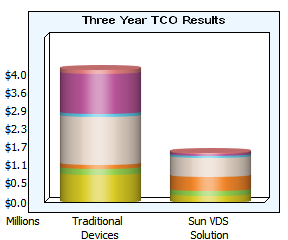Hello eveyone,
I found the topic of virtualization really interesting. Since Oracle is the de facto leader in database technology, I thought I would see what they have to offer
for client virtualization. I did this to try and put some numbers to this concept of client virtualization and to see what a leader in the industry is currently providing. While Oracle has a virtualization solution that covers from every level from storage to application - they also a client product that looks very promising, especially for the healthcare industry. I think everyone will agree that healthcare is a major challenge for America and client virtualization can help in 2 vital areas - controlling costs and making information more available for doctors and nurses and other healthcare workers. Since Oracle bought Sun, they have worked together to produce this integrated solution.
> From Oracle's website , we see that:
"Part of Oracle's suite of virtualization tools is the Oracle Desktop Virtualization for Healthcare. Oracle’s virtual desktop solution for healthcare addresses
these challenges by providing caregivers with secure, mobile access to HIS and patient records—wherever and whenever they need them. It does this by virtualizing
complete desktop environments and installing them in the datacenter where they can be secured, managed, and maintained. As a result, caregivers spend significantly
less time accessing critical data, and the IT department ends up managing a few servers rather than hundreds or even thousands of desktop devices. This is really
composed of 3 tools all working together to produce a fast, very secure tool for busy healthcare professionals: "
Oracle Sun Ray Clients
----------------------
"Provide an interoperable, zero-administration desktop virtualization client solution that reduces the maintenance, upgrade, and operational costs commonly associated
with PC environments. These are simple, low-cost ($250.) devices that are ideal for displaying server-hosted virtual desktops. Sun Ray Clients consume significantly
less energy than traditional PCs and have no fan to attract and spread airborne contaminants for patients and care providers to breathe. Because Sun Ray Clients are
clean and quiet, many healthcare organizations are finding them to be the only devices acceptable to place in the room near the patient. Integrated smart card readers
help ensure quick access to desktop sessions from any Sun Ray Client."
Oracle Virtual Desktop Infrastructure
-------------------------------------
"Delivers a complete solution for managing, hosting, and providing access to virtualized desktop environments housed in the datacenter."
Oracle Secure Global Desktop
----------------------------
"Provides secure access to centralized, server-hosted Windows, Linux, Oracle Solaris, mainframe, and midrange applications from a wide variety of popular client
devices."
http://www.oracle.com/us/technologies/virtualization/virtualization-for-healthcare-302507.html
> An independent review by EWeek.com of the Sun Ray client found the Sun Ray very easy to use and configure. This review can be found at:
http://www.eweek.com/c/a/Desktops-and-Notebooks/Oracle-Sun-Thin-Client-Hardware-Hosts-Desktop-Workloads-714426/
> I then decided to use the Oracle's link to the 'Desktop Virtualizaton ROI Calculator', found at: http://www.oracle.com/us/technologies/virtualization/061984.html
which takes you to a ROI developed by leading ROI consultancy Alinean, Inc. Once there, I choose 'Healthcare' as the industry and selected 500 as the number of
clients, with 200 of those being new Sun Ray clients and 300 being thin clients on existing PC's.
These are the results:
Clearly there are great benefits to using client virtualization that many organizations should explore further. The costs of buying a $250. device over a traditional PC are obvious, but the real savings are the desktop user productivity and the reduction in business risks.
Thank you,
Wayne
References:
===========
E-Week.com
http://www.eweek.com/c/a/Desktops-and-Notebooks/Oracle-Sun-Thin-Client-Hardware-Hosts-Desktop-Workloads-714426/
Oracle Corporation website:
http://www.oracle.com/us/technologies/virtualization/061984.html
http://www.oracle.com/us/technologies/virtualization/index.html
http://www.oracle.com/us/technologies/virtualization/virtualization-for-healthcare-302507.html
Sunday, April 17, 2011
Wednesday, April 6, 2011
Project - Secure email
Hi Everyone,
I completed the secure email as indicated in my Inbox:
This is the link to an article about a Data Encryption feature in the Oracle 11.2 database:
http://www.dba-oracle.com/t_11g_new_transparent_tablespace.htm
This article is from Burleson Consulting, who consult and support Oracle databases.
Our textbook indicates Oracle databases make up 40% of the databases in this country. Their ability to store a wide range of data makes Oracle the market leader and often a target of security issues. Oracle version 11.2 allows users to store any table in encrypted form by designating a tablespace as encrypted using the Transparent Data Encryption(TDE) feature. You can store multiple tables in a tablespace and multiple tablespaces make up an Oracle database.
Oracle does this by using a master encryption key and an external encryption 'wallet'. It can use either 3DES168, AES128, AES192, or AES256 encryption algorithms. This encryption will protect data like credit card numbers or social security numbers from hackers who may be able to copy a database datafile from the server. Anyone storing sensitive customer information in an Oracle database should be using this TDE feature.
Go Gators !
Wayne
I completed the secure email as indicated in my Inbox:
This is the link to an article about a Data Encryption feature in the Oracle 11.2 database:
http://www.dba-oracle.com/t_11g_new_transparent_tablespace.htm
This article is from Burleson Consulting, who consult and support Oracle databases.
Our textbook indicates Oracle databases make up 40% of the databases in this country. Their ability to store a wide range of data makes Oracle the market leader and often a target of security issues. Oracle version 11.2 allows users to store any table in encrypted form by designating a tablespace as encrypted using the Transparent Data Encryption(TDE) feature. You can store multiple tables in a tablespace and multiple tablespaces make up an Oracle database.
Oracle does this by using a master encryption key and an external encryption 'wallet'. It can use either 3DES168, AES128, AES192, or AES256 encryption algorithms. This encryption will protect data like credit card numbers or social security numbers from hackers who may be able to copy a database datafile from the server. Anyone storing sensitive customer information in an Oracle database should be using this TDE feature.
Go Gators !
Wayne
Subscribe to:
Comments (Atom)




